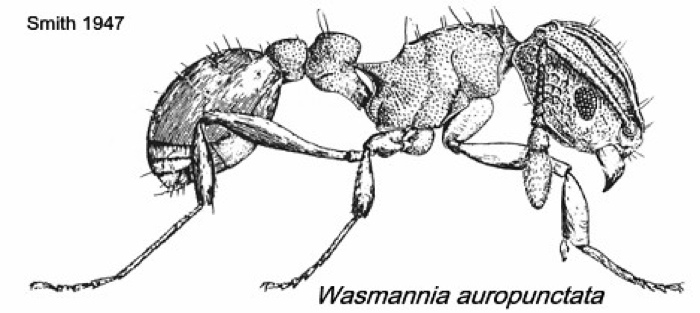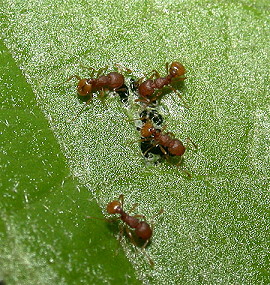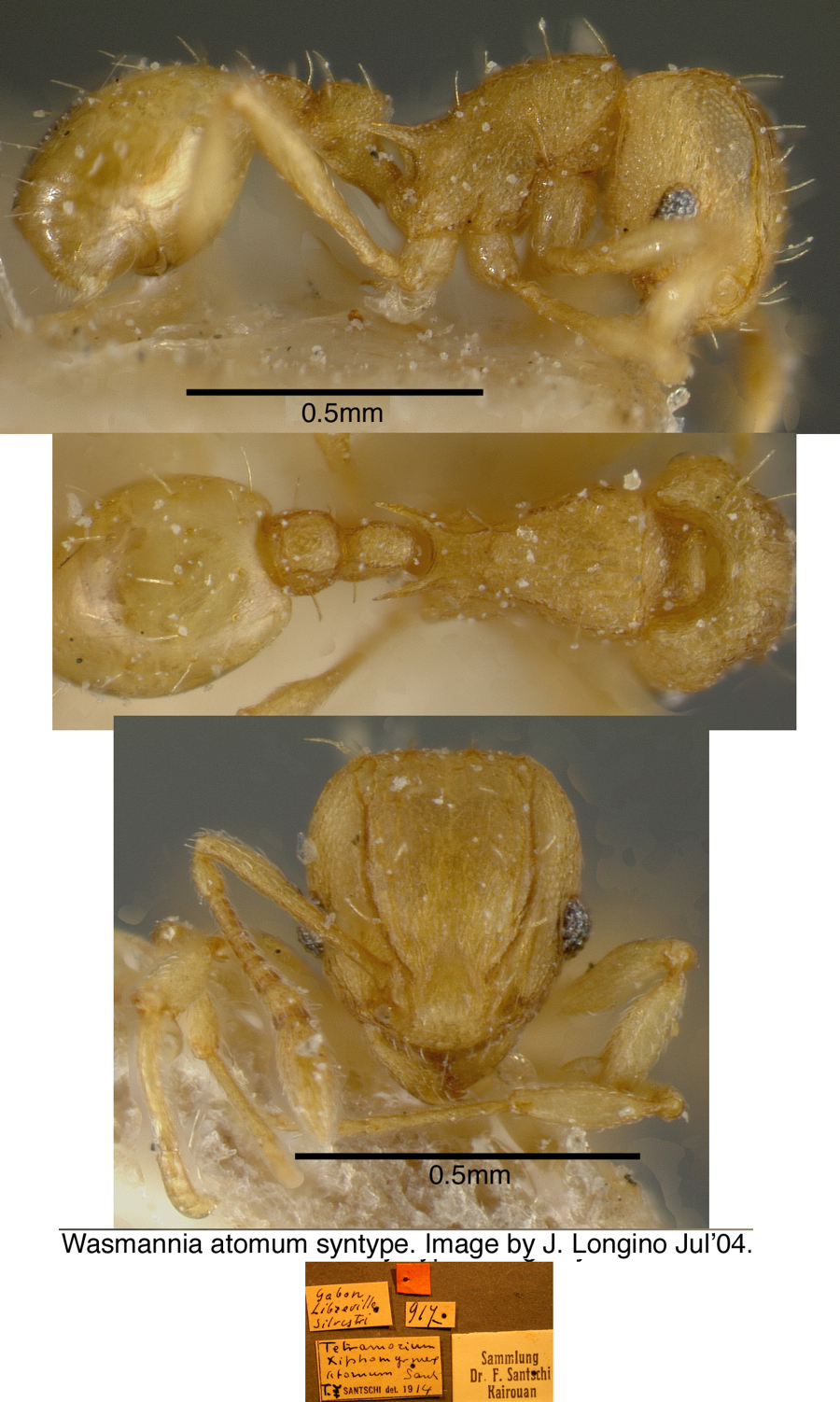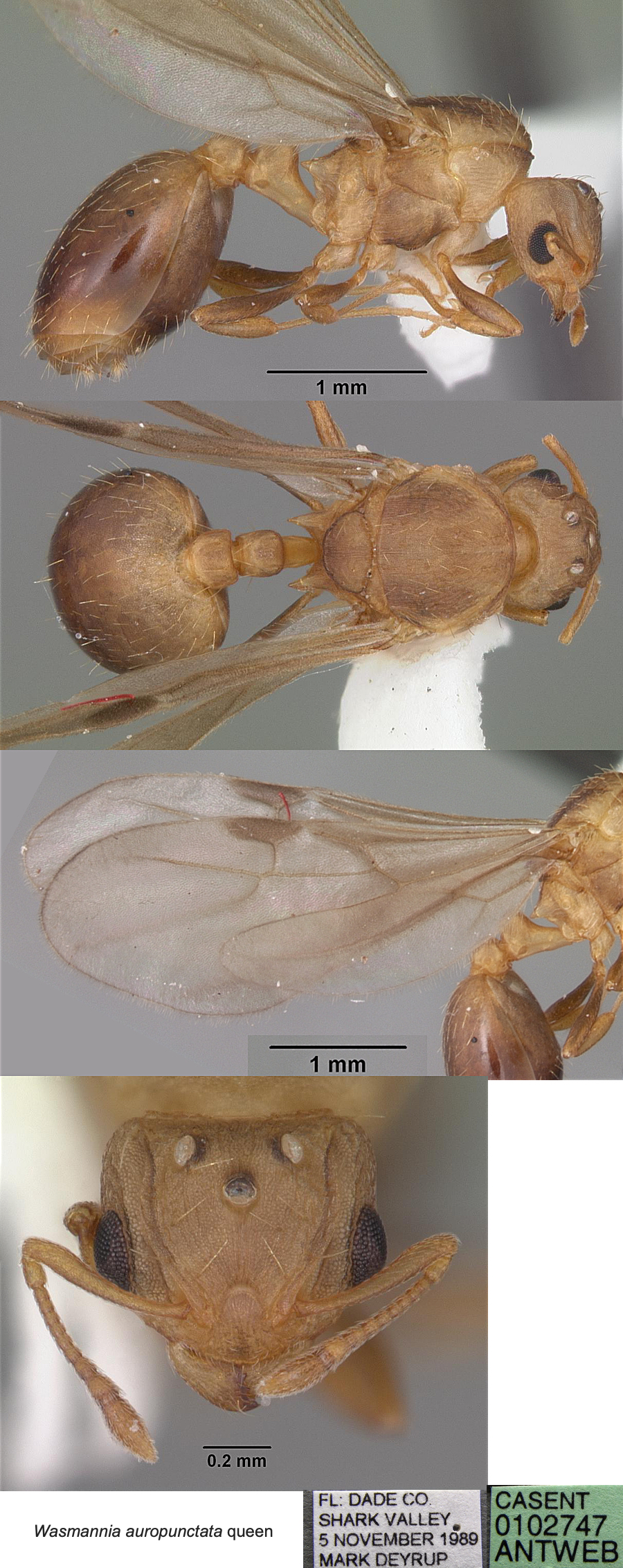Wasmannia auropunctata (Roger)
  Type location Cuba (Tetramorium
auropunctatum nov. sp., Roger, 1863a: 182, all forms; in Wasmannia,
Forel, 1893g: 383) - no images on Antweb (November 2018) Type location Cuba (Tetramorium
auropunctatum nov. sp., Roger, 1863a: 182, all forms; in Wasmannia,
Forel, 1893g: 383) - no images on Antweb (November 2018)
junior synonyms likewise neotropical except for atomum (Xiphomyrmex
atomum n. sp., Santschi, 1914d: 370,
worker; synonymy by Wheeler, 1922: 912) from Gabon, Libreville,
by F. Silvestri - see below
(see Bolton, 1995)  . .
|
 Roger's
(1863a) description is at Roger's
(1863a) description is at  . Forel's (1893g) description of the queen
and male is at . Forel's (1893g) description of the queen
and male is at  . Santschi's (1914d)
description of Xiphomyrmex atomum is at . Santschi's (1914d)
description of Xiphomyrmex atomum is at  and seems very accurate. and seems very accurate.
WORKER - minute, TL less than 2.0 mm. Antennae
11-segmented, with a 3-segmented club. Antennal scrobes present,
bounded below by a weak longitudinal carina running above the eye.
Anterodorsal angles of the pronotum acute, pronotum strongly marginate
anteriorly. Promesonotal suture absent, metanotal grove weakly
impressed. Propodeum bispinose, metapleural lobes present.
|
Entwistle
(1972) described it as insignificant and yellow-brown, worker only 1.4
mm long. Mainly nesting in the ground either between dead leaves or in
rotten wood, or especially in the dry season, in soil at the base of
trees. Occasionally nesting in dead wood on trees.
 This is
included because Bolton (1973a) noted that
the species had been introduced into the cocoa growing areas of
Cameroun. It is a pantropical tramp species, and a specimen from
the USA is pictured by Hölldobler & Wilson (1990, page 125, shown
right). Entwistle (1972) related how it had been introduced to Africa
prior to 1921, when it was recorded by Wheeler (1922) from Libreville
(found by F. Silvestri, "evidently introduced from South America") in Gabon.
By the time Entwistle wrote, it had spread extensively into the region
of Kribi, some 112 km south of Douala, in Cameroun. There it
had become a useful component of biological control against mirids (de
Miré, 1969). This is
included because Bolton (1973a) noted that
the species had been introduced into the cocoa growing areas of
Cameroun. It is a pantropical tramp species, and a specimen from
the USA is pictured by Hölldobler & Wilson (1990, page 125, shown
right). Entwistle (1972) related how it had been introduced to Africa
prior to 1921, when it was recorded by Wheeler (1922) from Libreville
(found by F. Silvestri, "evidently introduced from South America") in Gabon.
By the time Entwistle wrote, it had spread extensively into the region
of Kribi, some 112 km south of Douala, in Cameroun. There it
had become a useful component of biological control against mirids (de
Miré, 1969).
The
photograph left is of Wasmannia auropunctata
from Guarambaré, Dept. Central, Paraguay and is reduced from the superb
Myrmecos.net original taken by Alex Wild (click to see original).
|
Oxford University Museum
specimens
Wasmannia auropunctata
B Taylor det.
|
Cameroun
A Fotso Kuate
Sample 63
|
28.vii.2010
Nko’ondo
03°54'30" N
11°25'58"
|
aphid survey
|
1
|
 |
|
 The photomontage is of a
worker from Cameroun; Nko'ondo;
collector A Fotso Kuate (fk unmounted 63). The photomontage is of a
worker from Cameroun; Nko'ondo;
collector A Fotso Kuate (fk unmounted 63).
|
 The photomontage
is of the type of atomum from Libreville, Gabon. Original
images taken by J Longino; collated from the AMNH collection at Antbase.org The photomontage
is of the type of atomum from Libreville, Gabon. Original
images taken by J Longino; collated from the AMNH collection at Antbase.org
See also http://www.antweb.org/specimenImages.do?name=casent0912541
|
 The photomontage
is of a queen collated from http://www.antweb.org/specimenImages.do?name=casent0101747 The photomontage
is of a queen collated from http://www.antweb.org/specimenImages.do?name=casent0101747
|
 The photomontage
is of a male collated from http://www.antweb.org/specimenImages.do?name=casent017325041 The photomontage
is of a male collated from http://www.antweb.org/specimenImages.do?name=casent017325041
|
|